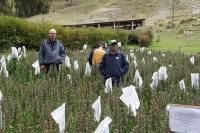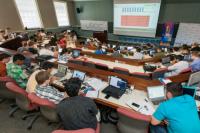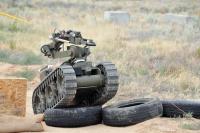-
Climate assessment must be relevant and useful to policymakers
Climate change assessments must be more relevant to policymakers’ needs, experts say. They argue that coming off the Paris agreement late last year, ambition for fighting climate change is high. They assert that groups like the Intergovernmental Panel on Climate Change (IPCC) should capitalize on this increased enthusiasm by integrating studies and presenting their results in ways that are useful to policymakers.
-
-
Holocaust survivors give historic $400 million gift to Ben-Gurion University
A couple who survived the Holocaust and made a fortune investing with Warren Buffett left a $400 million bequest to Ben-Gurion University (BGU). The bequest, much of which is earmarked to fund water-related research, is expected to double the size of BGU’s current endowment. The university’s Zuckerberg Institute for Water Research focuses on sustainability of water resources, desalination techniques, and improving water quality.
-
-
We need better information to understand extreme weather
Scientists need more credible and relevant information to help communities become more resilient to extreme weather events such as floods. Researchers need improved techniques to be able to understand why the climate is changing, and the part humans play in this process, experts say.
-
-
Crop breeding is not keeping pace with climate change

Crop yields will fall within the next decade due to climate change unless immediate action is taken to speed up the introduction of new and improved varieties, experts have warned. The researchers focused on maize in Africa but the underlying processes affect crops across the tropics.
-
-
Losing control: The dangers of killer robots
New technology could lead humans to relinquish control over decisions to use lethal force. As artificial intelligence advances, the possibility that machines could independently select and fire on targets is fast approaching. Fully autonomous weapons, also known as “killer robots,” are quickly moving from the realm of science fiction toward reality. While the process of creating international law is notoriously slow, countries can move quickly to address the threats of fully autonomous weapons. They should seize the opportunity presented by the Convention on Conventional Weapons review conference, to be held this December, because the alternative is unacceptable: Allowing technology to outpace diplomacy would produce dire and unparalleled humanitarian consequences.
-
-
The contribution of human dynamics to coastal communities’ resilience
The National Academies of Sciences has established a $10 million grants program to fund projects that enhance the science and practice of coastal community resilience in the Gulf of Mexico region. Rather than focus on infrastructure needs or the built environment, as many existing resilience-focused programs do, the new grants program will support the study of the human dynamics that influence a community’s ability to respond to adverse events.
-
-
Western U.S. braces for “dangerous and deadly” 120 degrees heatwave

Forecasters have warned that temperatures in the western United States are set to reach 120 degrees in a “rare, dangerous, and deadly” heatwave. The forecasts have worried officials, who are bracing for devastating wildfires and power cuts which will knock out air-conditioning systems, leading to heat-related fatalities. The area which will be subjected to the heat wave stretches from Oklahoma to California. It is home to sixty-six million people, one-fifth of the U.S. population.
-
-
Year-long heat streak results in new global heat records
Fresh out of the oven that was a warm start to the year, global temperatures are on a roll: For the 13th consecutive month, the globe was record warm in May — the longest such stretch in 137 years of record-keeping. The more than yearlong heat streak also resulted in other new global heat records.
-
-
Nation’s elite cybersecurity talent participate in U.S. Cyber Challenge program

A week from today, Illinois’ top cybersecurity talent will descend upon Moraine Valley Community College outside of Chicago to participate in the annual U.S. Cyber Challenge (USCC) Cyber Camp. During the week-long camp, individuals will participate in a variety of classes that cover such subjects as packet crafting and pen testing, and compete in a virtual Capture the Flag competition to demonstrate their cybersecurity abilities in a free-form environment in hopes of winning one of the limited (ISC)2 scholarship vouchers.
-
-
In Sweden, replacing nuclear power with wind power does not make sense
The Swedish power supply is largely free of carbon emissions. Indeed, it is mainly based on a combination of hydroelectric and nuclear power combined with power exchange with neighboring Scandinavian countries. A new study, investigating the possibility of replacing nuclear power with wind power, which is by nature intermittent, concludes that a backup system, based on fossil fuel, namely gas, would be required in combination with wind power. In such a scenario, the CO2 emissions would double.
-
-
Future summers could regularly be hotter than the hottest summers on record
In fifty years, summers across most of the globe could regularly be hotter than any summer experienced so far by people alive today, according to a new study. If climate change continues on its current trajectory, the probability that any summer between 2061 and 2080 will be warmer than the hottest on record is 80 percent across the world’s land areas, excluding Antarctica, which was not studied. If greenhouse gas emissions are reduced, however, that probability drops to 41 percent, according to the study.
-
-
Hazardous-devices teams compete at the Robot Rodeo, 14-17 June

Hazardous-devices teams from around the Southwest will wrangle their bomb-squad robots at the tenth annual Robot Rodeo beginning Tuesday, 14 June, at Los Alamos National Laboratory. “The Robot Rodeo gives bomb-squad teams the opportunity to practice and hone their skills in a lively but low-risk setting,” said a member of the Laboratory’s hazardous-devices team.
-
-
DHS awards $3 million in Small Business Innovation Research awards
The Department of Homeland Security (DHS) Science and Technology Directorate (S&T) last week announced a total of $3.1 million in competitive research awards for twenty-nine small businesses located across twelve states and Washington, D.C. Each business was awarded approximately $100,000 in preliminary funding through DHS S&T’s Small Business Innovation Research (SBIR) program. Thirty-one contracts were awarded in ten topic areas.
-
-
DHS announces $40 million funding opportunity for new Criminal Investigations Center of Excellence
DHS S&T earlier this week announced a $40 million funding opportunity for an institution to lead a new DHS Center of Excellence (COE) for Criminal Investigations and Network Analysis. This new COE will conduct end user-focused research to enhance investigation strategies of transnational criminal organizations’ (TCO) activities and other homeland security-related crimes.
-
-
U.S., Saudi universities to promote security studies
The University of New Haven will collaborate in the development of a new 4-year baccalaureate degree program in security studies, to be delivered at King Fahd Security College (KFSC) in Riyadh, the capital of Saudi Arabia. Experts from UNH’s Henry C. Lee College of Criminal Justice and Forensic Sciences will advise their counterparts at KFSC on the creation and accreditation in Saudi Arabia of a baccalaureate degree in security studies with three specialization tracks: criminal justice, homeland security, and intelligence studies.
-
More headlines
The long view
New Technology is Keeping the Skies Safe
DHS S&T Baggage, Cargo, and People Screening (BCP) Program develops state-of-the-art screening solutions to help secure airspace, communities, and borders
Factories First: Winning the Drone War Before It Starts
Wars are won by factories before they are won on the battlefield,Martin C. Feldmann writes, noting that the United States lacks the manufacturing depth for the coming drone age. Rectifying this situation “will take far more than procurement tweaks,” Feldmann writes. “It demands a national-level, wartime-scale industrial mobilization.”
How Artificial General Intelligence Could Affect the Rise and Fall of Nations
Visions for potential AGI futures: A new report from RAND aims to stimulate thinking among policymakers about possible impacts of the development of artificial general intelligence (AGI) on geopolitics and the world order.
Smaller Nuclear Reactors Spark Renewed Interest in a Once-Shunned Energy Source
In the past two years, half the states have taken action to promote nuclear power, from creating nuclear task forces to integrating nuclear into long-term energy plans.
Keeping the Lights on with Nuclear Waste: Radiochemistry Transforms Nuclear Waste into Strategic Materials
How UNLV radiochemistry is pioneering the future of energy in the Southwest by salvaging strategic materials from nuclear dumps –and making it safe.
Model Predicts Long-Term Effects of Nuclear Waste on Underground Disposal Systems
The simulations matched results from an underground lab experiment in Switzerland, suggesting modeling could be used to validate the safety of nuclear disposal sites.
